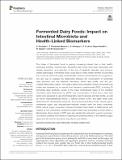Por favor, use este identificador para citar o enlazar a este item:
http://hdl.handle.net/10261/201836COMPARTIR / EXPORTAR:
 SHARE SHARE
 CORE
BASE CORE
BASE
|
|
| Visualizar otros formatos: MARC | Dublin Core | RDF | ORE | MODS | METS | DIDL | DATACITE | |

| Campo DC | Valor | Lengua/Idioma |
|---|---|---|
| dc.contributor.author | González Solares, Sonia | - |
| dc.contributor.author | Fernández-Navarro, Tania | - |
| dc.contributor.author | Arboleya, Silvia | - |
| dc.contributor.author | González de los Reyes-Gavilán, Clara | - |
| dc.contributor.author | Salazar, Nuria | - |
| dc.contributor.author | Gueimonde Fernández, Miguel | - |
| dc.date.accessioned | 2020-02-25T09:48:33Z | - |
| dc.date.available | 2020-02-25T09:48:33Z | - |
| dc.date.issued | 2019-05-24 | - |
| dc.identifier | doi: 10.3389/fmicb.2019.01046 | - |
| dc.identifier | issn: 1664-302X | - |
| dc.identifier.citation | Frontiers in Microbiology 10: 1046 (2019) | - |
| dc.identifier.uri | http://hdl.handle.net/10261/201836 | - |
| dc.description.abstract | The intake of fermented foods is gaining increasing interest due to their health-promoting benefits. Among them, fermented dairy foods have been associated with obesity prevention, and reduction of the risk of metabolic disorders and immune-related pathologies. Fermented foods could lead to these health benefits by providing the consumer with both easily metabolizable nutrients and beneficial microorganisms. Our aim was to evaluate the relationship between the consumption of fermented dairy products and the intestinal microbiota, serum lipid profile, and the pro-oxidant/inflammatory status. 130 healthy adults were evaluated. Dietary fermented food intake was assessed by an annual food frequency questionnaire (FFQ), including 26 fermented dairy products. Levels of the major phylogenetic types of the intestinal microbiota were determined by qPCR, and concentration of fecal short chain fatty acids were assessed by gas chromatography. Serum glucose and lipid profile, as well as serum malondialdehyde (MDA), C-reactive protein (CRP), and leptin levels were determined by standardized protocols. Among fermented dairy foods, natural yogurt, sweetened yogurt and matured/semi-matured cheese were the most consumed. While natural yogurt consumers showed increased fecal levels of Akkermansia with respect to non-consumers, sweetened yogurt intake was associated to lower levels of Bacteroides. Serum levels of CRP were also significantly reduced in yogurt consumers. Our results underline the interest in exploring the potential effects of the different yogurt types and the role the microbiota may play in such effects. | - |
| dc.description.sponsorship | This work was funded through the Grant GRUPIN14-043 “Microbiota Humana, Alimentación y Salud” funded by “Plan Regional de Investigación del Principado de Asturias,” Asturias, Spain and by the Alimerka Foundation. NS is the recipient of a postdoctoral contract awarded by the Fundación para la Investigación Biosanitaria de Asturias (FINBA). Public National and Regional grants received co-funding from European Union FEDER funds. SA is the recipient of a postdoctoral Maria Curie contract funded by the EU | - |
| dc.language | eng | - |
| dc.publisher | Frontiers Media | - |
| dc.relation.isversionof | Publisher's version | - |
| dc.rights | openAccess | - |
| dc.subject | Fermented foods | - |
| dc.subject | Yogurt | - |
| dc.subject | Inflammation | - |
| dc.subject | Microbiota | - |
| dc.subject | Oxidative stress | - |
| dc.title | Fermented dairy foods: Impact on intestinal microbiota and health-linked biomarkers | - |
| dc.type | artículo | - |
| dc.identifier.doi | 10.3389/fmicb.2019.01046 | - |
| dc.relation.publisherversion | http://dx.doi.org/10.3389/fmicb.2019.01046 | - |
| dc.date.updated | 2020-02-25T09:48:33Z | - |
| dc.rights.license | http://creativecommons.org/licenses/by-nc-nd/4.0/ | - |
| dc.contributor.funder | Principado de Asturias | - |
| dc.contributor.funder | Fundación para la Investigación y la Innovación Biosanitaria del Principado de Asturias | - |
| dc.contributor.funder | European Commission | - |
| dc.relation.csic | Sí | - |
| dc.identifier.funder | http://dx.doi.org/10.13039/501100000780 | es_ES |
| dc.identifier.funder | http://dx.doi.org/10.13039/100011941 | es_ES |
| dc.contributor.orcid | González, Sonia [0000-0003-2602-7036] | - |
| dc.contributor.orcid | Arboleya, Silvia [0000-0002-6155-5822] | - |
| dc.contributor.orcid | González de los Reyes-Gavilán, Clara [0000-0001-9396-631] | - |
| dc.contributor.orcid | Salazar, Nuria [0000-0003-1435-7628] | - |
| dc.contributor.orcid | Gueimonde Fernández, Miguel [0000-0002-0192-901X] | - |
| dc.identifier.pmid | 31191465 | - |
| dc.type.coar | http://purl.org/coar/resource_type/c_6501 | es_ES |
| item.cerifentitytype | Publications | - |
| item.openairecristype | http://purl.org/coar/resource_type/c_18cf | - |
| item.grantfulltext | open | - |
| item.openairetype | artículo | - |
| item.fulltext | With Fulltext | - |
| Aparece en las colecciones: | (IPLA) Artículos | |
Ficheros en este ítem:
| Fichero | Descripción | Tamaño | Formato | |
|---|---|---|---|---|
| Fermental_dairy.pdf | 4,01 MB | Adobe PDF |  Visualizar/Abrir |
CORE Recommender
PubMed Central
Citations
41
checked on 29-abr-2024
SCOPUSTM
Citations
80
checked on 01-may-2024
WEB OF SCIENCETM
Citations
67
checked on 24-feb-2024
Page view(s)
179
checked on 03-may-2024
Download(s)
216
checked on 03-may-2024

